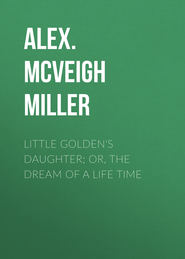По всем вопросам обращайтесь на: info@litportal.ru
(©) 2003-2024.
✖
Pretty Geraldine, the New York Salesgirl; or, Wedded to Her Choice
Настройки чтения
Размер шрифта
Высота строк
Поля
"Ah! no, she is not dead! I could almost wish that she were, in my dread that she is dead to me forever! And if she is, oh, if she is, how can I bear the gloom of my life henceforward?—the blank darkness of a night of storm following on the sunshine of a perfect day. Oh, God!" groaned Hawthorne, tossing his arms above his pillow in anguish.
The young poet gazed at him in deepest sympathy and pity. He had not loved yet, but he could understand and pity, for to the poet's soul all the secrets of life are felt and known through the subtle occultism of genius.
"The poet in a golden clime was born,
With golden stars above;
Dowered with the hate of hate, the scorn of scorn,
The love of love.
"He saw through life and death, through good and ill,
saw through his own soul."
As Ralph gazed at the handsome face of the unhappy lover, he felt that here was the material for a novelist's pen to frame a most bewitching love-story, and he hoped that some day Hawthorne would confide in him.
Suddenly the young man looked up at him, saying, abruptly:
"Ralph, I want you to take me to the best detective in Chicago to-morrow morning."
"Very well," replied Ralph, going to a table and mixing a sedative that had been used under Doctor Rowe's orders. He presented it to the patient, saying:
"Drink this, or you won't be able to stir to-morrow morning."
Hawthorne complied readily, for he was, indeed, weary of the tumult of his mind and heart.
He closed his eyes wearily, and Ralph dimmed the light and returned to his study, and the last verse of the pretty poem he was composing.
When he had written the last line he heard Hawthorne breathing gently in a saving sleep, and he, too, retired to his bed.
Both slept late the next morning, and breakfast and the morning papers were brought up together for Hawthorne.
Ralph saw that his charge was comfortable, and went out to a neighboring cafe where he was wont to meet his friend Mr. Hill at the morning meal.
Hawthorne made a very light meal in bed, dismissed the servant with the tray, and then turned his attention to the newspapers—the Chicago Herald first.
And as he skimmed over the telegraphic news from abroad, he came across a paragraph that worked a curious change in him.
His face grew pale with emotion, and sinking back on his pillow, he sighed to himself:
"I must go home."
When Ralph returned with Mr. Hill, who always made a morning call on his protege, as he humorously termed Hawthorne, they found the patient dressing in feverish haste.
"Boys, I must return to New York to-day," he exclaimed.
While they gazed at him in surprise, he continued:
"Business of a very important nature obliges me to cross the ocean as soon as possible; and—in brief—I owe you both a debt of gratitude that I wish to repay you by asking you to accompany me on my trip to Europe as my guests. Will you come? I am not poor, as you supposed, in the kindness of your hearts, when you took me in, a stranger, and nursed and cared for me, and a cordial welcome will meet you in my English home!"
They were startled and surprised at his generosity, but Hawthorne would not listen to their refusals.
"I love you both like brothers, and I will not be refused. You shall come with me," he declared, and his cordiality won their consent.
Arrangements were speedily made, and after a visit to a detective, the three friends left for New York.
CHAPTER XL.
"IT IS LIKE SUICIDE!"
"Round the post-office window are pressing
A motley and turbulent throng.
All eagerly bent on possessing
The letter they've looked for so long.
To some come dark tidings of sorrow,
To others come tidings of bliss;
Uncertain is every to-morrow,
And the world like the post-office is."
Francis S. Smith.
All unconscious of the fact that she had been so near to the lover for whom she mourned, Geraldine returned home with her mother, and even as they went up the steps the postman followed on his afternoon round and placed two letters in her hand.
She glanced at them, and a cry of joy broke from her lips as she saw that one bore the New York postmark and was in Cissy's familiar hand.
The other one was postmarked Chicago, and was addressed to the governess, Miss Erroll.
And if Geraldine could have guessed how fatally that letter concerned herself, she would have been justified in tearing it to fragments and scattering it in wrath to the four winds of heaven.
If some saving hypnotic power had but impelled her to this course, what suffering she would have been spared. But in her joy over Cissy's letter, she scarcely gave a thought to Miss Erroll.
Going up stairs to her own apartments, she passed the school-room and tapped lightly on the door.
"A letter for you," she said, courteously, to the governess, not noticing how the woman's hand trembled, when she took it.
But the face of Miss Erroll grew ashy pale when, alone with her pupils, she opened and read her letter from Clifford Standish.
"To think that she should have this letter in her hands; that she should have brought it to me, it is a mockery of fate! It is like—suicide!" she muttered, through her writhing lips, and a bitter sigh heaved her breast.
Geraldine hurried to her own rooms and read Cissy's letter before she removed her wraps, so eager was her fond heart for news from New York.
"She will be here to-morrow, to-morrow, the dear girl!" she cried, joyfully, kissing the letter in the exuberance of her gladness.
But the letter contained other news that was very puzzling.
"Harry followed me to Chicago on the next train, the darling boy! But how strange that he has never come to me! Does he know where I am? Is he in the same city with me?" were questions that repeated themselves over and over in her bewildered brain.
She could understand now why he had never answered her letter. Of course, he had never received it, since he was on her trail following her abductor and his victim in their flight from New York.
"But why, oh, why does he not come to me? Is it possible he cannot find me, my dear, dear, love? Ah, I have it now! He is following Clifford Standish up, and of course he can find no trace of me," she decided, and immediately resolved to insert personals in the prominent newspapers of the next day in the hope of reaching him.
When she had exchanged her carriage dress for a lovely house robe, fluttering with lace and ribbons, she sought her mother, with Cissy's letter.
The young poet gazed at him in deepest sympathy and pity. He had not loved yet, but he could understand and pity, for to the poet's soul all the secrets of life are felt and known through the subtle occultism of genius.
"The poet in a golden clime was born,
With golden stars above;
Dowered with the hate of hate, the scorn of scorn,
The love of love.
"He saw through life and death, through good and ill,
saw through his own soul."
As Ralph gazed at the handsome face of the unhappy lover, he felt that here was the material for a novelist's pen to frame a most bewitching love-story, and he hoped that some day Hawthorne would confide in him.
Suddenly the young man looked up at him, saying, abruptly:
"Ralph, I want you to take me to the best detective in Chicago to-morrow morning."
"Very well," replied Ralph, going to a table and mixing a sedative that had been used under Doctor Rowe's orders. He presented it to the patient, saying:
"Drink this, or you won't be able to stir to-morrow morning."
Hawthorne complied readily, for he was, indeed, weary of the tumult of his mind and heart.
He closed his eyes wearily, and Ralph dimmed the light and returned to his study, and the last verse of the pretty poem he was composing.
When he had written the last line he heard Hawthorne breathing gently in a saving sleep, and he, too, retired to his bed.
Both slept late the next morning, and breakfast and the morning papers were brought up together for Hawthorne.
Ralph saw that his charge was comfortable, and went out to a neighboring cafe where he was wont to meet his friend Mr. Hill at the morning meal.
Hawthorne made a very light meal in bed, dismissed the servant with the tray, and then turned his attention to the newspapers—the Chicago Herald first.
And as he skimmed over the telegraphic news from abroad, he came across a paragraph that worked a curious change in him.
His face grew pale with emotion, and sinking back on his pillow, he sighed to himself:
"I must go home."
When Ralph returned with Mr. Hill, who always made a morning call on his protege, as he humorously termed Hawthorne, they found the patient dressing in feverish haste.
"Boys, I must return to New York to-day," he exclaimed.
While they gazed at him in surprise, he continued:
"Business of a very important nature obliges me to cross the ocean as soon as possible; and—in brief—I owe you both a debt of gratitude that I wish to repay you by asking you to accompany me on my trip to Europe as my guests. Will you come? I am not poor, as you supposed, in the kindness of your hearts, when you took me in, a stranger, and nursed and cared for me, and a cordial welcome will meet you in my English home!"
They were startled and surprised at his generosity, but Hawthorne would not listen to their refusals.
"I love you both like brothers, and I will not be refused. You shall come with me," he declared, and his cordiality won their consent.
Arrangements were speedily made, and after a visit to a detective, the three friends left for New York.
CHAPTER XL.
"IT IS LIKE SUICIDE!"
"Round the post-office window are pressing
A motley and turbulent throng.
All eagerly bent on possessing
The letter they've looked for so long.
To some come dark tidings of sorrow,
To others come tidings of bliss;
Uncertain is every to-morrow,
And the world like the post-office is."
Francis S. Smith.
All unconscious of the fact that she had been so near to the lover for whom she mourned, Geraldine returned home with her mother, and even as they went up the steps the postman followed on his afternoon round and placed two letters in her hand.
She glanced at them, and a cry of joy broke from her lips as she saw that one bore the New York postmark and was in Cissy's familiar hand.
The other one was postmarked Chicago, and was addressed to the governess, Miss Erroll.
And if Geraldine could have guessed how fatally that letter concerned herself, she would have been justified in tearing it to fragments and scattering it in wrath to the four winds of heaven.
If some saving hypnotic power had but impelled her to this course, what suffering she would have been spared. But in her joy over Cissy's letter, she scarcely gave a thought to Miss Erroll.
Going up stairs to her own apartments, she passed the school-room and tapped lightly on the door.
"A letter for you," she said, courteously, to the governess, not noticing how the woman's hand trembled, when she took it.
But the face of Miss Erroll grew ashy pale when, alone with her pupils, she opened and read her letter from Clifford Standish.
"To think that she should have this letter in her hands; that she should have brought it to me, it is a mockery of fate! It is like—suicide!" she muttered, through her writhing lips, and a bitter sigh heaved her breast.
Geraldine hurried to her own rooms and read Cissy's letter before she removed her wraps, so eager was her fond heart for news from New York.
"She will be here to-morrow, to-morrow, the dear girl!" she cried, joyfully, kissing the letter in the exuberance of her gladness.
But the letter contained other news that was very puzzling.
"Harry followed me to Chicago on the next train, the darling boy! But how strange that he has never come to me! Does he know where I am? Is he in the same city with me?" were questions that repeated themselves over and over in her bewildered brain.
She could understand now why he had never answered her letter. Of course, he had never received it, since he was on her trail following her abductor and his victim in their flight from New York.
"But why, oh, why does he not come to me? Is it possible he cannot find me, my dear, dear, love? Ah, I have it now! He is following Clifford Standish up, and of course he can find no trace of me," she decided, and immediately resolved to insert personals in the prominent newspapers of the next day in the hope of reaching him.
When she had exchanged her carriage dress for a lovely house robe, fluttering with lace and ribbons, she sought her mother, with Cissy's letter.











